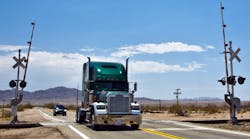The third largest U.S. railroad union rejected a deal with employers on Oct. 10, reopening the possibility of a strike that would weaken an already-strained supply chain and hamstring the trucking industry, even though the union agreed to continue working for the next month.
More than half of track maintenance workers represented by the Brotherhood of Maintenance of Way Employes Division who voted submitted ballots against ratification of the tentative national agreement reached with the Class I freight railroads. Of the ballots, 6,646 were against ratification and 5,100 voted in favor.
Employees were ready to strike last month, but a last-minute tentative agreement avoided the likelihood of a nationwide freight crisis. With the Brotherhood of Maintenance Way rejecting the current proposal, the possibility of a strike has resurfaced for next month. In its statement, the union said it would strike no earlier than Nov. 19, five days after Congress reconvenes, to allow time for additional talks.
See also: As trucking braced for impact, 'tentative agreement' avoids freight-rail strike
Anxiety spread through the trucking industry in September ahead of that tentative agreement. An Association of American Railroads (AAR) report found that a nationwide rail service interruption would dramatically impact economic output and could cost more than $2 billion per day. A strike would shift freight load demands—30% of the nation’s overall freight—to truckload carriers, which would be overloaded due to ongoing driver and equipment shortages.
“Idling all 7,000 long-distance daily freight trains in the U.S. would require more than 460,000 additional long-haul trucks every day, which is not possible based on equipment availability and an existing shortage of 80,000 drivers,” American Truck Associations President and CEO Chris Spear wrote in a Sept. 9 letter sent to Capitol Hill. “As such, any rail service disruption will create havoc in the supply chain and fuel inflationary pressures across the board.”
See also: Class 8 orders soar in September to record high. Can OEMs deliver?
Rail workers offered money, but request time off
Rail workers denied the proposed five-year contract containing 24% pay raises and $5,000 in bonuses. Union President Tony Cardwell said the proposal did not adequately address workers’ desires for more paid time off and sick leave. The contracts, including the pay raises, were drafted based on recommendations of the Presidential Emergency Board, a panel of arbitrators approved by President Biden, according to the National Retail Federation.
“Railroaders do not feel valued,” Cardwell said. “They resent the fact that management holds no regard for their quality of life, illustrated by their stubborn reluctance to provide a higher quantity of paid time off, especially for sickness. The result of this vote indicates that there is a lot of work to do to establish goodwill and improve the morale that has been broken by the railroads’ executives and Wall Street hedge fund managers.”
Four other railroad unions approved their new agreements, but all 12 unions representing 115,000 workers must ratify their contracts to prevent a strike, according to The Associated Press.
Todd Vachon, Rutgers University professor and director of its Labor Education Action Research Network, told the AP that he was not surprised the contract was rejected because, amid a labor shortage that allows workers increased bargaining power, the key request of paid time off was not addressed.
“The biggest sticking issue is quality of life—especially access to paid time off and paid sick time. If the railroads can make some movement in that area, it will likely go a long way with rail workers who currently feel they are not being respected by their employers,” Vachon said. “Wages and resource allocation are one important part of contract negotiations, but feeling respected by one’s employer remains one of the top reasons that workers form and join unions.”



